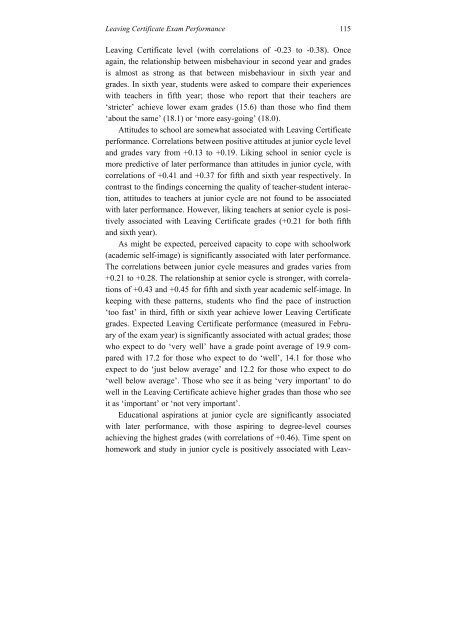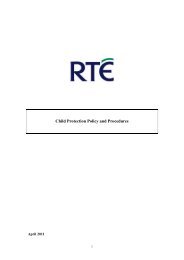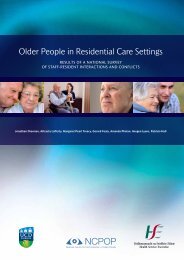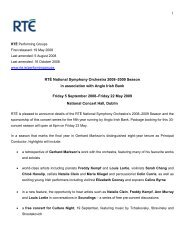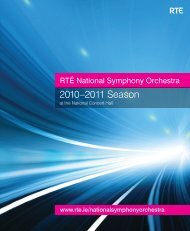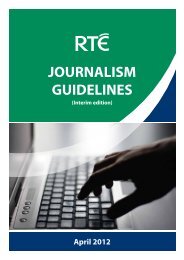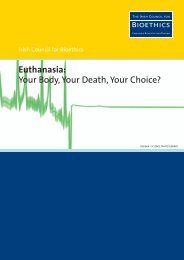From Leaving CertiFiCate to Leaving SChooL a Longitudinal Study ...
From Leaving CertiFiCate to Leaving SChooL a Longitudinal Study ...
From Leaving CertiFiCate to Leaving SChooL a Longitudinal Study ...
You also want an ePaper? Increase the reach of your titles
YUMPU automatically turns print PDFs into web optimized ePapers that Google loves.
<strong>Leaving</strong> Certificate Exam Performance 115<br />
<strong>Leaving</strong> Certificate level (with correlations of -0.23 <strong>to</strong> -0.38). Once<br />
again, the relationship between misbehaviour in second year and grades<br />
is almost as strong as that between misbehaviour in sixth year and<br />
grades. In sixth year, students were asked <strong>to</strong> compare their experiences<br />
with teachers in fifth year; those who report that their teachers are<br />
‘stricter’ achieve lower exam grades (15.6) than those who find them<br />
‘about the same’ (18.1) or ‘more easy-going’ (18.0).<br />
Attitudes <strong>to</strong> school are somewhat associated with <strong>Leaving</strong> Certificate<br />
performance. Correlations between positive attitudes at junior cycle level<br />
and grades vary from +0.13 <strong>to</strong> +0.19. Liking school in senior cycle is<br />
more predictive of later performance than attitudes in junior cycle, with<br />
correlations of +0.41 and +0.37 for fifth and sixth year respectively. In<br />
contrast <strong>to</strong> the findings concerning the quality of teacher-student interaction,<br />
attitudes <strong>to</strong> teachers at junior cycle are not found <strong>to</strong> be associated<br />
with later performance. However, liking teachers at senior cycle is positively<br />
associated with <strong>Leaving</strong> Certificate grades (+0.21 for both fifth<br />
and sixth year).<br />
As might be expected, perceived capacity <strong>to</strong> cope with schoolwork<br />
(academic self-image) is significantly associated with later performance.<br />
The correlations between junior cycle measures and grades varies from<br />
+0.21 <strong>to</strong> +0.28. The relationship at senior cycle is stronger, with correlations<br />
of +0.43 and +0.45 for fifth and sixth year academic self-image. In<br />
keeping with these patterns, students who find the pace of instruction<br />
‘<strong>to</strong>o fast’ in third, fifth or sixth year achieve lower <strong>Leaving</strong> Certificate<br />
grades. Expected <strong>Leaving</strong> Certificate performance (measured in February<br />
of the exam year) is significantly associated with actual grades; those<br />
who expect <strong>to</strong> do ‘very well’ have a grade point average of 19.9 compared<br />
with 17.2 for those who expect <strong>to</strong> do ‘well’, 14.1 for those who<br />
expect <strong>to</strong> do ‘just below average’ and 12.2 for those who expect <strong>to</strong> do<br />
‘well below average’. Those who see it as being ‘very important’ <strong>to</strong> do<br />
well in the <strong>Leaving</strong> Certificate achieve higher grades than those who see<br />
it as ‘important’ or ‘not very important’.<br />
Educational aspirations at junior cycle are significantly associated<br />
with later performance, with those aspiring <strong>to</strong> degree-level courses<br />
achieving the highest grades (with correlations of +0.46). Time spent on<br />
homework and study in junior cycle is positively associated with Leav-


